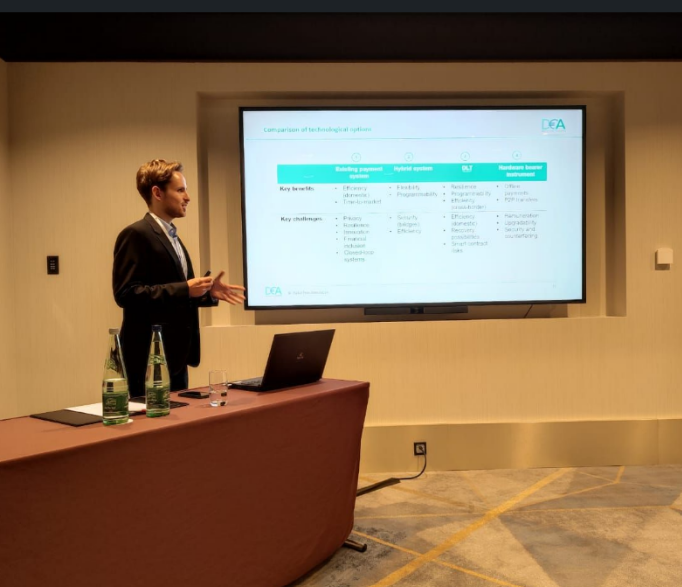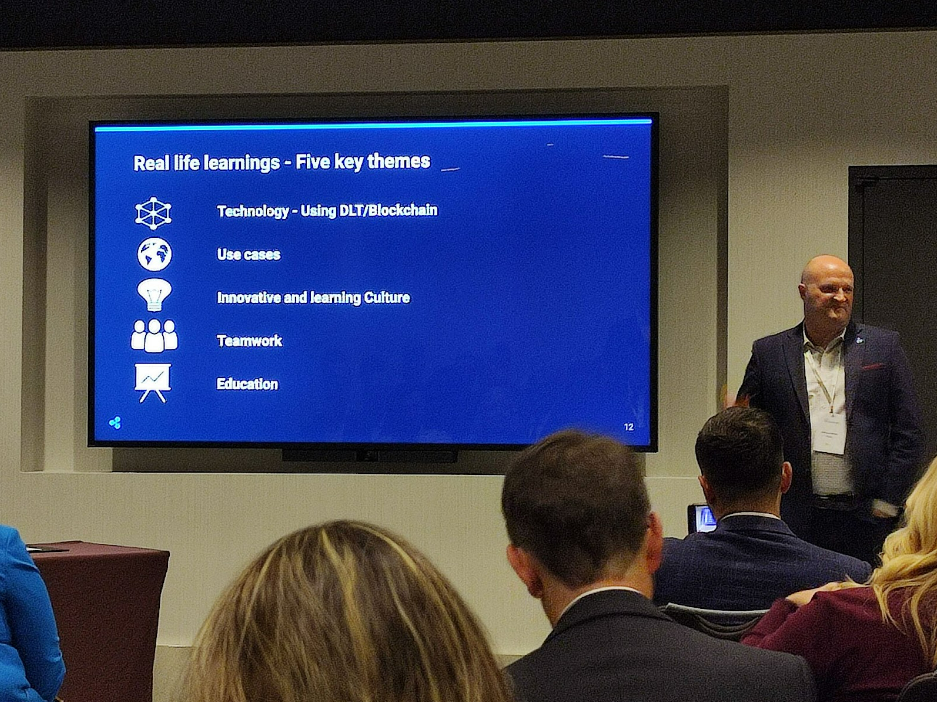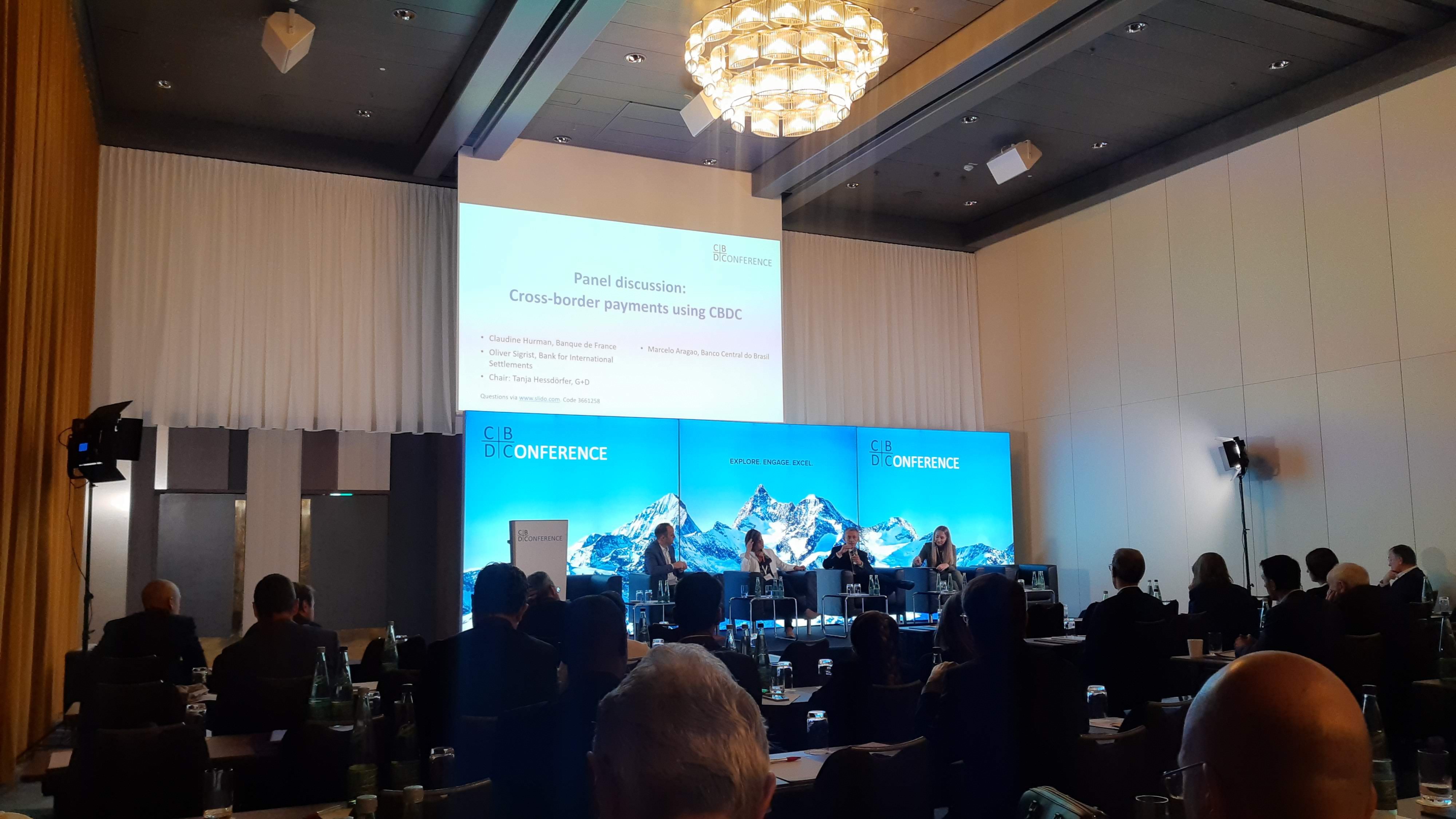Share this
Recap of the CBDC Conference 2022
by Digital Euro Association on Sep 20, 2022 9:00:00 AM
The much anticipated CBDC Conference was held in Frankfurt, Germany, from August 29-31, 2022. This leading central bank digital currency (CBDC) conference offered representatives from central banks, the financial sector, technology providers, policymakers, and academics the perfect platform to learn about the latest developments in CBDC, exchange ideas, and advance the cause of CBDCs globally.
42 Central Banks and 190 delegates from 50 countries attended the 3-day conference. The Digital Euro Association (DEA) participated in two sessions: (1) conducting a workshop on technical solutions for CBDCs and their implications in the use cases, and (2) chairing a panel about offline payments and financial inclusion through CBDC.
If you missed the CBDC Conference 2022, let us bring you up to speed!
Day 1: Technical choices, case studies and more
The first day’s program consisted of various sessions. The first few sessions consisted of academic workshops, where attendees were introduced to the technical aspects of CBDCs. Dr. Jonas Gross, Chairman of DEA, kicked off the program by outlining the different CBDC design choices and their commensurate use cases.
 Dr. Jonas Gross - Chairman of DEA
Dr. Jonas Gross - Chairman of DEA
The afternoon sessions started with a keynote by the Bank for International Settlements, followed by a panel entitled “What we are trying to achieve with a CBDC”. The Swiss National Bank, Bank of Canada, Payments Innovation, and Amazon Web Services debated this topic, each providing their points of view.
The subsequent sessions were dedicated to showing and discussing specific projects like the Central Bank of Nigeria’s (CBN) eNaira, the digital Tenge by the National Bank of Kazakhstan, and the eCEDI by the Bank of Ghana.
The eNaira was launched as the world’s second CBDC on 25 October 2021. The CBN listed several domestic policy goals for CBDCs, including ensuring financial inclusion, improving the availability of and access to central bank money, and making payment systems more efficient and resilient. The eNaira is also intended to improve cross-border payments and make remittances to Nigeria cheaper.
Day 2: Design and policy aspects, user factor and payments by Web3 stack
The morning of the second day consisted of presentations on the Sand Dollar from the Central Bank of the Bahamas, the Bank of Thailand's various CBDC projects, followed by a panel about design and policy aspects by the Norges Bank, the European Commission, the Bank of England and The World Savings and Retail Banking Institute (WSBI-ESBG).
The Sand Dollar was launched in October 2020 as the world’s first CBDC. Shaqueno Porter from the Central Bank of Bahamas noted that their main policy goals are financial inclusion, improved access to payments, efficiency of payments, resilience, and the reduction of illicit use of money.
The afternoon sessions were focused on the user aspects of CBDCs, and representatives of the Italian Bank Association, the Eastern Caribbean Central Bank (ECCB), Lietuvos Bankas, and Bundesbank discussed these various requirements.
Presentations by the Bank of Jamaica (JAM-DEX) and the Bank of Zambia then followed. Ammer Group demonstrated how to enable fast, accessible and truly global payments for frontier markets using the Web3 stack.
DCash is the CBDC issued by the ECCB in the context of a pilot. The pilot started in March 2021 in some countries of the Eastern Caribbean Currency Union (ECCU) and is expected to last at least until the summer of 2023, one year after the last country is planned to join the pilot. DCash is designed mainly for retail use, with the aim to improve efficiency and resilience of the payment system and financial inclusion.
 DEA Executive Directors Tamara Ferreira Schmidt (Left) and Conrad Kraft (Right) with Sharmyn Powell - Eastern Caribbean Central Bank Chief Risk Officer (Centre)
DEA Executive Directors Tamara Ferreira Schmidt (Left) and Conrad Kraft (Right) with Sharmyn Powell - Eastern Caribbean Central Bank Chief Risk Officer (Centre)
Presentations by the Bank of Jamaica (JAM-DEX) and the Bank of Zambia then followed. Ammer Group demonstrated how to enable fast, accessible and truly global payments for frontier markets using the Web3 stack.
 Victor Ammer - Trustody (Standing Left), Kombe Kaponda - Bank of Zambia (Centre) and Beat Attinger - CBDC Conference (Right)
Victor Ammer - Trustody (Standing Left), Kombe Kaponda - Bank of Zambia (Centre) and Beat Attinger - CBDC Conference (Right)
Real-life pilots and learnings
Antony Welfare outlined key learnings garnered from Ripple’s experience in CBDC projects. He also shed more light on the Republic of Palau issuing a national stablecoin using XRP Ledger. He noted that the initial focus of the project was developing strategies for cross-border payments and a USD-backed digital currency for Palau.
 Antony Welfare (Ripple)
Antony Welfare (Ripple)
Day 3: Collaborative approach, offline payments and DeFi.
The conference’s last day commenced with a presentation by Ripple about how a CBDC can be a platform for innovation, improving lives of citizens and businesses through financial inclusion. The subsequent sessions considered the presentations of the e-krona by Sveriges Riksbank, and the digital shekel CBDC project by the Bank of Israel.
The Bank of Japan and the Association of German Banks participated in a panel discussion on the required collaborative approach to properly embedding CBDCs in the existing financial system. The Central Bank of Brazil shared its projects on cross-border payments using CBDC.
 Panel discussion: Cross-border payments using CBDC | Oliver Sigrist - BIS (Left), Claudine Hurman - Banque de France (Centre-Left), Marcelo Aragao - Banco Central do Brasil (Centre-Right) and Tanja Hessdörfer - Giesecke+Devrient (Right)
Panel discussion: Cross-border payments using CBDC | Oliver Sigrist - BIS (Left), Claudine Hurman - Banque de France (Centre-Left), Marcelo Aragao - Banco Central do Brasil (Centre-Right) and Tanja Hessdörfer - Giesecke+Devrient (Right)
The afternoon sessions began with a conceptual panel regarding CBDC, stablecoins, and other digital forms of money. The Digital Dollar Project, the Central Bank of Nigeria and the National Bank of Georgia shared their visions, risks, challenges and opportunities of CBDCs.
Conrad Kraft, Executive Director of DEA, discussed offline payments and financial inclusion using CBDCs with the Central Bank of Hungary, the Bank of Ghana, the Bank of Zambia, and nChain. It was surprising how many CBDC tech providers focus on offline payment use cases, demonstrating its importance to the successful adoption of CBDCs.
 Panel discussion: Offline payments and financial inclusion through CBDC | Kombe Kaponda - Bank of Zambia (Left), Conrad Kraft - DEA (Centre-Left), Aniko Szombati - Central bank of Hungary (Centre), Simit Naik - nChain (Centre-Right) and Kwame Oppong - Bank of Ghana (Right)
Panel discussion: Offline payments and financial inclusion through CBDC | Kombe Kaponda - Bank of Zambia (Left), Conrad Kraft - DEA (Centre-Left), Aniko Szombati - Central bank of Hungary (Centre), Simit Naik - nChain (Centre-Right) and Kwame Oppong - Bank of Ghana (Right)
The final panel discussion brought the topic of CBDC and DeFi to the fore, where the Bank of France, the Bank of Finland, Celo, and EMTECH discussed whether the decentralized finance world needs CBDCs and if private organizations can provide an equivalent solution.
 Conrad Kraft (DEA), Chris Ostrowsky (Celo), John Ho (Standard Chartered Bank), Dr. Jonas Gross (DEA)
Conrad Kraft (DEA), Chris Ostrowsky (Celo), John Ho (Standard Chartered Bank), Dr. Jonas Gross (DEA)
It was a real treat to finally meet so many colleagues and experts in the CBDC sphere in person after communicating virtually for so many years.
Takeaways
- The collaboration between different jurisdictions is fundamental to ensuring the furtherance of a CBDC projects’ goals. Real-world use cases are a better learning tool than just theoretical assumptions.
- The participation of the private sector is crucial for the success of CBDC projects. Banks and other financial institutions need to change their business models to accommodate innovation and handle the problem of a fragmented market.
- The sooner citizens are included in the CBDC development process, the better.
- It’s not sufficient to simply issue a CBDC that has very similar features to current payment methods. Adoption should be driven by strong value propositions and tangible benefits for citizens.
- There is a huge demand for education related to CBDCs, both from the private and public sectors. Towards this end, in August 2022, DEA intensified the knowledge dissemination by releasing a paper called “Ahead of the Digital Euro - Public Digital Euro Working Group Recommendations”, which was well-received by the entire community.
Share this
- CBDC (44)
- Events (27)
- Partnership (27)
- Digital euro (24)
- Stablecoins (24)
- Quarterly Insights (8)
- ECB (7)
- Privacy (4)
- Thesis Awards (4)
- Article series (3)
- Central bank digital currencies (3)
- Crypto (3)
- Jobs (3)
- Law, regulation & policy (3)
- Tokenized Deposits (3)
- digital yuan (3)
- Academics (2)
- DEC23 (2)
- DEC25 (2)
- Digital Money (2)
- Members Assembly (2)
- MiCA (2)
- Public Hearing (2)
- Regulation (2)
- Sand Dollar (2)
- e-CNY (2)
- monetarypolicy (2)
- Adoption (1)
- Ai (1)
- Blockchain (1)
- Central Banking (1)
- Cross-Border (1)
- DEC24 (1)
- Diem (1)
- Digital Euro Association (1)
- Digital Pound (1)
- Digital Pound Foundation (1)
- Education (1)
- Eurocoin (1)
- Facebook Pay (1)
- FinTech (1)
- Geopolitics (1)
- Novi (1)
- Offline (1)
- Petition (1)
- Project Hamilton (1)
- Public Affairs (1)
- Quantum (1)
- Ripple (1)
- Technology & IT (1)
- USA (1)
- investors (1)
- May 2025 (4)
- April 2025 (5)
- January 2025 (1)
- December 2024 (3)
- November 2024 (3)
- October 2024 (4)
- September 2024 (2)
- August 2024 (3)
- July 2024 (6)
- June 2024 (1)
- May 2024 (4)
- April 2024 (4)
- March 2024 (4)
- February 2024 (4)
- January 2024 (2)
- December 2023 (3)
- November 2023 (2)
- October 2023 (3)
- September 2023 (5)
- August 2023 (5)
- July 2023 (9)
- June 2023 (5)
- May 2023 (3)
- April 2023 (2)
- March 2023 (7)
- February 2023 (3)
- January 2023 (3)
- November 2022 (2)
- October 2022 (4)
- September 2022 (8)
- August 2022 (11)
- July 2022 (4)
- June 2022 (5)
- May 2022 (3)
- April 2022 (6)
- March 2022 (8)
- February 2022 (6)
- January 2022 (1)
- December 2021 (1)
- November 2021 (1)
- October 2021 (1)


Comments (1)